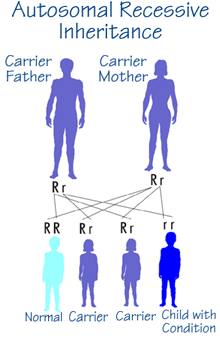Information for Health Care Providers - NPD Type C
An Excellent Summary of Information about Niemann-Pick Disease, type C can be found by selecting the link below to the GeneReviews section of the GeneTest resource for healthcare providers. This is an NIH-funded resource on clinical and research genetic testing.
Inheritance
All types of NPD are inherited in an autosomal recessive pattern and can affect both males and females. The disease occurs when both copies of a person's NPC1 or NPC2 gene have a mutation (a change in a gene which causes it to function incorrectly). Carriers have one normally functioning copy of the gene and one copy that does not function correctly due to a mutation; carriers do NOT have NPD. Being a carrier of NPD is not known to lead to any health problems. Less than 1% of people are Type C NPD carriers.
A person with NPD inherits one gene mutation from each parent, both of whom are carriers. Each child of two carrier parents has: a 25% chance of being unaffected and not a carrier (having two functioning copies of the gene), a 50% chance of being an NPD carrier (having one functioning and one non-functional copy of the gene, like his/her parents), and a 25% chance of having NPD (having no working copies of the gene).

Blood relatives (siblings, aunts/uncles, cousins, etc.) of patients with NPD may also be carriers of an NPD gene mutation. If the mutations in the affected family member are known, definitive carrier testing can be done for these relatives.
If one parent has Type C NPD, and the other parent is not affected and is not a Type C NPD carrier, then all of their children will be carriers but will not have NPD.
If one parent has Type C NPD, and the other is a carrier, in each pregnancy there is a 50% chance that the child will have Type C NPD and a 50% chance that the child will be a Type C NPD carrier.
The different details of each family history will cause the risk figures and other genetic counseling issues to vary from family to family, and in members of the extended family. Genetic counseling is recommended for all couples in which both partners are known to be carriers or if one partner is a known carrier and the other's status is uncertain.
Updated 3/30/2010 CWV
